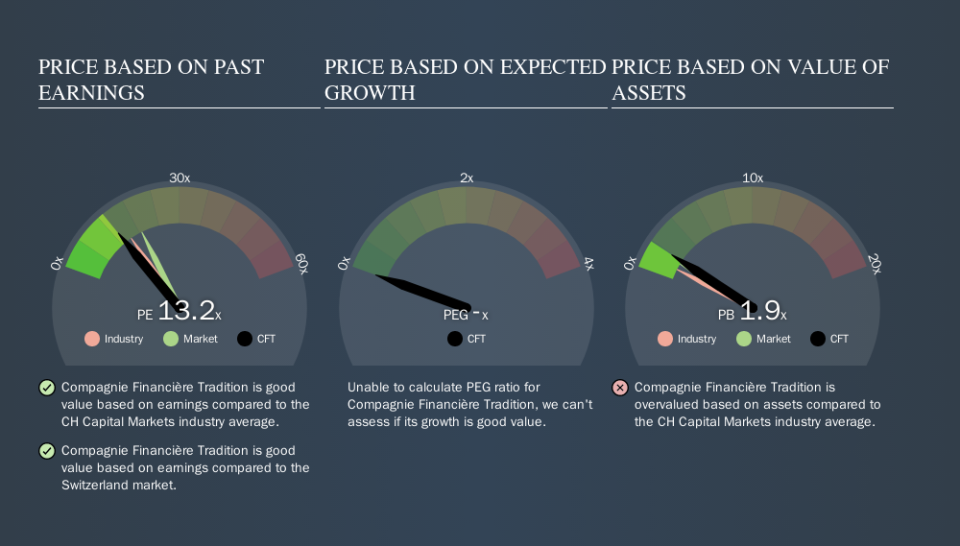Does Compagnie Financière Tradition SA (VTX:CFT) Have A Good P/E Ratio?

Today, we'll introduce the concept of the P/E ratio for those who are learning about investing. To keep it practical, we'll show how Compagnie Financière Tradition SA's (VTX:CFT) P/E ratio could help you assess the value on offer. Based on the last twelve months, Compagnie Financière Tradition's P/E ratio is 13.19. In other words, at today's prices, investors are paying CHF13.19 for every CHF1 in prior year profit.
View our latest analysis for Compagnie Financière Tradition
How Do You Calculate A P/E Ratio?
The formula for P/E is:
Price to Earnings Ratio = Price per Share ÷ Earnings per Share (EPS)
Or for Compagnie Financière Tradition:
P/E of 13.19 = CHF100.50 ÷ CHF7.62 (Based on the year to June 2019.)
Is A High Price-to-Earnings Ratio Good?
A higher P/E ratio means that investors are paying a higher price for each CHF1 of company earnings. That isn't a good or a bad thing on its own, but a high P/E means that buyers have a higher opinion of the business's prospects, relative to stocks with a lower P/E.
Does Compagnie Financière Tradition Have A Relatively High Or Low P/E For Its Industry?
We can get an indication of market expectations by looking at the P/E ratio. The image below shows that Compagnie Financière Tradition has a lower P/E than the average (15.1) P/E for companies in the capital markets industry.
This suggests that market participants think Compagnie Financière Tradition will underperform other companies in its industry. While current expectations are low, the stock could be undervalued if the situation is better than the market assumes. If you consider the stock interesting, further research is recommended. For example, I often monitor director buying and selling.
How Growth Rates Impact P/E Ratios
Probably the most important factor in determining what P/E a company trades on is the earnings growth. If earnings are growing quickly, then the 'E' in the equation will increase faster than it would otherwise. That means unless the share price increases, the P/E will reduce in a few years. And as that P/E ratio drops, the company will look cheap, unless its share price increases.
Compagnie Financière Tradition's earnings per share grew by -5.0% in the last twelve months. And it has bolstered its earnings per share by 38% per year over the last five years.
A Limitation: P/E Ratios Ignore Debt and Cash In The Bank
The 'Price' in P/E reflects the market capitalization of the company. In other words, it does not consider any debt or cash that the company may have on the balance sheet. In theory, a company can lower its future P/E ratio by using cash or debt to invest in growth.
Such expenditure might be good or bad, in the long term, but the point here is that the balance sheet is not reflected by this ratio.
Is Debt Impacting Compagnie Financière Tradition's P/E?
Net debt totals just 0.6% of Compagnie Financière Tradition's market cap. The market might award it a higher P/E ratio if it had net cash, but its unlikely this low level of net borrowing is having a big impact on the P/E multiple.
The Verdict On Compagnie Financière Tradition's P/E Ratio
Compagnie Financière Tradition has a P/E of 13.2. That's below the average in the CH market, which is 18.7. EPS grew over the last twelve months, and debt levels are quite reasonable. If you believe growth will continue - or even increase - then the low P/E may signify opportunity.
Investors should be looking to buy stocks that the market is wrong about. As value investor Benjamin Graham famously said, 'In the short run, the market is a voting machine but in the long run, it is a weighing machine. We don't have analyst forecasts, but shareholders might want to examine this detailed historical graph of earnings, revenue and cash flow.
You might be able to find a better buy than Compagnie Financière Tradition. If you want a selection of possible winners, check out this free list of interesting companies that trade on a P/E below 20 (but have proven they can grow earnings).
We aim to bring you long-term focused research analysis driven by fundamental data. Note that our analysis may not factor in the latest price-sensitive company announcements or qualitative material.
If you spot an error that warrants correction, please contact the editor at editorial-team@simplywallst.com. This article by Simply Wall St is general in nature. It does not constitute a recommendation to buy or sell any stock, and does not take account of your objectives, or your financial situation. Simply Wall St has no position in the stocks mentioned. Thank you for reading.


